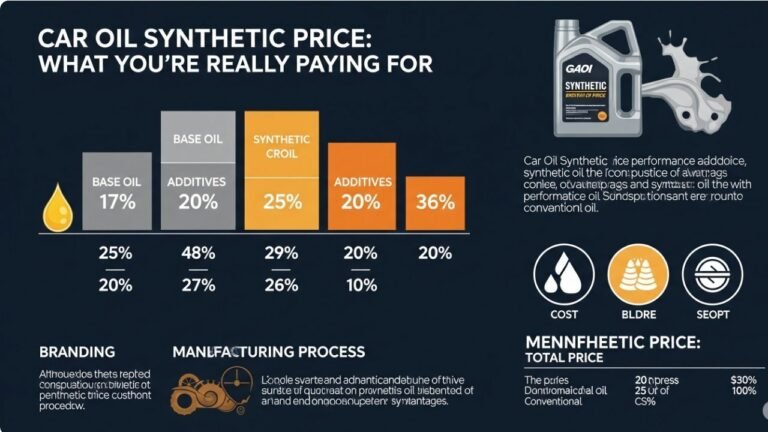Oil Change Car How Often: The Truth You Didn’t Know

We’ve all been there—cruising down the highway, music up, windows down, and then that pesky little light pops on. Yep, the oil change reminder. It’s like your car whispering, “Hey, take care of me!” But the real question is: “Oil change car how often?” It’s not just about what the sticker on your windshield says. It’s about knowing your car, your lifestyle, and what’s really under the hood.
In this guide, we’ll take a deep dive into how often you actually need to change your oil. Forget the old myths and vague advice. Let’s talk real numbers, real stories, and real-life situations. Think of this as a conversation with a trusted friend who’s been through it and wants to spare you the guesswork.
Why Oil Changes Matter More Than You Think

When I bought my first car—a hand-me-down Toyota Corolla—I thought oil changes were just a scam at quick lube places. I skipped them. After 18 months, the engine started sounding like a lawnmower in pain. Lesson learned the hard way.
Regular oil changes extend your engine’s life, improve gas mileage, and help avoid major repair costs. According to AAA, cars with frequent oil changes can last over 200,000 miles with fewer breakdowns.
The Classic 3,000-Mile Rule: Still True?
Remember the “every 3,000 miles” rule? It’s one of those old-school pieces of advice that stuck around. But does it still apply?
The answer: Sometimes, but not always.
Here’s the deal. Back in the day, motor oil wasn’t as advanced, and engines weren’t built for long intervals. But now? Synthetic oils and modern engines can go 5,000 to 10,000 miles—sometimes even more.
Here’s a quick comparison:
| Oil Type | Typical Change Interval |
|---|---|
| Conventional Oil | 3,000 – 5,000 miles |
| Synthetic Blend Oil | 5,000 – 7,500 miles |
| Full Synthetic Oil | 7,500 – 10,000+ miles |
It’s like comparing rotary phones to smartphones—technology evolves. The best answer to “oil change car how often” depends on your car’s make, model, and oil type.
Driving Habits Change Everything
Not all miles are created equal. A car that cruises open highways isn’t wearing down like a car stuck in bumper-to-bumper traffic.
Let me explain. My cousin Sarah drives 15 miles daily to her job—mostly on calm country roads. Meanwhile, I drive 5 miles to the city office, but it takes 45 minutes in stop-and-go traffic. Guess whose car works harder? Yep, mine.
Short trips, extreme heat or cold, towing heavy loads, or stop-and-go traffic? These are called “severe driving conditions.” And they mean more stress on your engine—and more frequent oil changes.
Here are some severe conditions to consider:
-
Frequent short trips under 5 miles
-
Extreme outdoor temperatures
-
Idling in heavy traffic
-
Towing or hauling heavy loads
-
Driving on dusty or gravel roads
If this sounds like your routine, your car probably needs oil changes on the shorter end of the spectrum.
Check the Owner’s Manual—Seriously
I get it. Manuals usually end up in the glove box, unread. But when it comes to oil change intervals, your owner’s manual is gold.
Car manufacturers spend years testing engines to figure out the best oil change schedule. Some even use smart sensors and onboard diagnostics that tell you when your oil is actually dirty.
My Honda Civic, for example, has an oil life indicator that calculates real-time engine wear. When it says 15% oil life remaining, I know it’s time to schedule an appointment. It’s smarter than me—and probably more accurate than relying on mileage alone.
So next time you wonder “oil change car how often”, take five minutes to check that manual or your car’s dashboard. You might be surprised.
Synthetic vs. Conventional Oil: What’s the Difference?
Ah yes, the oil aisle at the store. Rows of bottles, each shouting claims like “high mileage,” “advanced performance,” or “full synthetic.” It’s confusing. But here’s what really matters.
Conventional oil is refined from crude oil. It’s cheaper, but breaks down quicker and gets dirty faster.
Synthetic oil is engineered in a lab. It’s smoother, cleaner, and can last two to three times longer.
If your car takes synthetic, changing it every 3,000 miles is overkill. It’s like buying a gourmet meal and throwing it away halfway through. Instead, go 7,500 to 10,000 miles depending on your driving habits.
Yes, synthetic is more expensive upfront. But with fewer changes and better performance, it’s often worth it.
How Oil Monitoring Systems Are Changing the Game
Many newer cars come with Oil Life Monitoring Systems (OLMS). These systems use sensors to monitor driving conditions, temperature, engine revolutions, and more. They don’t just count miles—they track how you’re driving.
So instead of guessing, your car tells you when it’s time. It’s like having a mechanic riding shotgun (without the smell of grease and overalls).
But even if your car has this tech, don’t ignore it. I made that mistake once. I figured, “I’ve got synthetic oil and a smart car. I’ll push it another thousand miles.” Bad move. My engine started sputtering, and it cost me more than I’d like to admit.
Bottom line: trust the system—but don’t delay once it tells you it’s time. Modern cars are smart, but they can’t change oil for you.
The Hidden Costs of Skipping Oil Changes
Skipping oil changes seems harmless. “It’s just a few hundred miles,” you might think. But what’s really happening under the hood?
Old oil turns into sludge. It loses its ability to lubricate. Parts grind together. Metal wears out. The engine gets hotter, and eventually—it fails.
A buddy of mine ignored oil changes on his used BMW. After 18 months of driving without service, the engine seized up. Replacement cost? Over $6,000.
Here’s a quick list of what skipping oil changes can lead to:
-
Engine overheating
-
Reduced fuel efficiency
-
Poor performance
-
Shortened engine lifespan
-
Major repair costs
So while oil changes might cost $40–$80, they save you thousands in the long run.
Signs You’re Overdue for an Oil Change
Sometimes your car talks to you without words. You just have to listen. Here are a few signs it’s probably time for an oil change:
-
The oil looks dirty or black
-
Engine sounds louder than usual
-
Oil smell inside the cabin
-
Dashboard warning light
-
Decreased fuel economy
-
Engine performance feels sluggish
Trust your senses. Your nose, ears, and eyes are better than you think.
Seasonal Effects: How Weather Affects Oil Change Frequency
Let’s talk weather. Not the small talk kind—but the kind that messes with your engine oil.
In the winter, your engine oil thickens like honey in a fridge. This makes it harder to circulate, especially when starting your car in freezing temperatures. Meanwhile, in the summer, extreme heat can break oil down faster, reducing its protective power.
Living in extreme climates? Then yes—you’ll want to change your oil more often. It’s like sunscreen. If you’re spending all day in the sun, you need to reapply more.
I once drove through a blistering Arizona summer with the same oil I used during winter in Portland. Big mistake. The engine ran hot, my gas mileage tanked, and I ended up stuck on the roadside with steam pouring out of the hood.
Lesson? Always factor in your climate. Your car’s needs change just like yours do with the seasons.
High Mileage Cars and Oil Changes: A Special Case
Got a car that’s seen more birthdays than your nephew? Then it probably needs a little more love.
High mileage cars (think over 75,000 miles) often need special oil formulas. These oils include additives that reduce leaks, restore worn seals, and help with sludge buildup. They’re basically multivitamins for aging engines.
When I hit 100,000 miles in my trusty old Subaru, I started using high mileage synthetic oil. Not only did it cut down on oil consumption, but it also kept my engine smoother and quieter. It was like giving it a fresh pair of sneakers.
For older cars, keep these things in mind:
-
Stick to shorter oil change intervals (3,000–5,000 miles)
-
Use high-mileage oil if recommended
-
Watch for leaks and burning oil
Aging gracefully isn’t just for humans. It applies to engines too.
DIY vs. Mechanic: Who Should Change Your Oil?
Changing your own oil can feel like a rite of passage. You save money, learn about your car, and maybe even impress your dad. But is it worth it?
DIY oil changes are great if you’re handy and have time. You’ll need ramps, a wrench, an oil pan, and the right oil and filter. And a good pair of gloves—trust me on that.
But for many people, going to a mechanic or quick lube center is just easier. It’s fast, clean, and usually under $50 for a basic oil change.
Personally? I do a bit of both. When I have a free Saturday, I’ll do it myself. It’s oddly satisfying. But when life gets hectic, I’ll swing by my trusted local shop.
Whichever you choose, the most important thing is not skipping it.
How to Track Oil Changes Without Forgetting
We’ve all done it—missed an oil change because we forgot the date or mileage. Life gets busy.
But keeping track can be simple. Here are a few easy methods:
-
Use your phone’s calendar to set reminders
-
Stick the mileage/date label on your dashboard (not just the windshield)
-
Download a car maintenance app like Drivvo or Simply Auto
-
Keep a small notebook in the glove box for old-school tracking
I’ve been using Google Calendar for years. Every time I get an oil change, I just say, “Hey Google, remind me in 6,000 miles to change oil.” Works like magic.
Keeping good records also helps when you’re selling your car. Buyers love seeing maintenance logs. It shows you cared.
What Happens During an Oil Change Anyway?
You might think an oil change is just… changing oil. But it’s actually more than that—at least when done properly.
Here’s what a full service oil change usually includes:
-
Draining the old oil
-
Replacing the oil filter
-
Refilling with new oil (proper grade and type)
-
Topping off other fluids (coolant, wiper fluid, etc.)
-
Checking tire pressure and visual inspection
Some places go above and beyond. My local mechanic even checks belts and hoses. Think of it as a mini check-up for your car—like a doctor’s visit but quicker.
Skipping this basic routine? That’s like skipping your dentist for five years and expecting perfect teeth.
Is It Time-Based or Mileage-Based? Or Both?
Ah, the eternal question. If I barely drive, do I still need oil changes?
Yes. Yes, you do.
Even if your car sits in the driveway most days, oil degrades over time. Moisture builds up. Additives break down. That slick golden fluid turns into something that’s not doing your engine any favors.
Most mechanics agree: change your oil at least every 6 to 12 months, even if you haven’t hit the mileage mark.
I learned this the hard way during the pandemic. I barely drove, but didn’t change my oil for a year. When I finally did, the oil was thick and gross—like molasses. Not good.
Mileage and time both matter. Don’t ignore either.
Quick Bullet Recap: Oil Change Essentials
To wrap up everything we’ve covered, here’s a handy list:
-
Conventional oil = every 3,000–5,000 miles
-
Synthetic oil = every 7,500–10,000 miles
-
Short trips + tough conditions = change more often
-
Older/high-mileage cars = stick to shorter intervals
-
Check oil levels monthly (especially in older cars)
-
Don’t go longer than 12 months without a change
-
Always check your owner’s manual for specific guidance
And don’t forget, “oil change car how often” isn’t just about numbers—it’s about paying attention to your unique situation.
Final Thoughts: Take Care of Your Car, It’ll Take Care of You
Think of your car like a relationship. The more love and attention you give, the longer it lasts. Oil changes are the simplest way to show that care.
I’ve seen it firsthand. Friends who skip oil changes end up with car trouble, expensive repairs, or buying a new car way too soon. Meanwhile, my neighbor’s 1998 Camry is still purring along. Why? Because she never misses an oil change. Not once.
So next time that dashboard light pops on, don’t ignore it. Listen. Take action. Keep your engine happy—and your wallet full.
Your car might not be able to say “thank you,” but trust me—it feels it.






